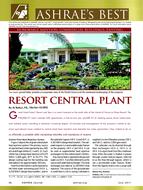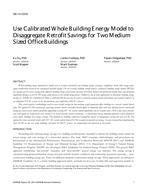Museums serve as the caretakers of cultural and natural artifacts. A number of factors can put artifacts at risk, including vandalism, theft, chemical attack, biological attack, temperature effects, humidity effects, and lighting. Most of these factors can be effectively controlled by implementing well-understood protective measures. However, humidity is frequently difficult to control in museums because they are often housed in old buildings with high infiltration loads and outdated heating, ventilating, and air-conditioning systems. One alternative to achieving humidity control entirely through active space conditioning systems for the museum’s macroenvironment is the use of solid adsorbent media positioned inside display cases or dioramas.
In this paper, we explore the efficacy of utilizing solid adsorbents for passive humidity control. Adsorption and desorption isotherms are experimentally determined for two conservation-grade media, as well as for standard silica gel. The media are compared on both a mass and cost basis for passively conditioning cases. Passive humidity control using solid adsorbent media can be effective for cases and dioramas that have moderate to low leakage rates. Standard density silica gel showed good performance and offers a cost-competitive alternative compared to museum-grade adsorbent media.
Units: Dual
Citation: ASHRAE Transactions, vol. 108, pt. 1, Atlantic City, 2002
Product Details
- Published:
- 2002
- Number of Pages:
- 10
- File Size:
- 1 file , 870 KB
- Product Code(s):
- D-6967


